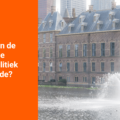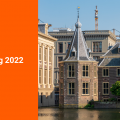
Last week's General Political Considerations showed that new power relations have emerged in Dutch politics. There is a lot to say about all the political news, but in the developments in the undercurrent we see three main lines that will be characteristic for public affairs in the coming period.
The cabinet as a municipal government
According to the coalition of PVV, VVD, BBB and NSC, the new cabinet will function according to an extra-parliamentary model, which means that decision-making in the cabinet and in the House of Representatives will be separate from each other. This gives more room for dualism. This model reminds me of my time as a municipal councillor in Ouderamstel and the way the municipal governance structure works. In this, the aldermen take on the executive tasks, while the municipal council determines the political course. Moreover, this cabinet has a non-partisan prime minister, with Dick Schoof who, as a bridge builder, 'stands above the parties'.
Although this model can be effective in municipalities, it leads to tensions at the national level. In just over two months, political leaders have criticised their own cabinet ministers in parliament on several issues. This indicates that there is a lack of harmony between parliament and ministers, which could threaten the stability of the government. For companies and NGOs, this means that political decision-making can become more complicated and unpredictable. It makes lobbying more difficult when organisations have to take into account both parliament and executive ministers.
Agenda-setting officials seek help from civil society
A second important development is the changing power relationship between politicians and civil servants. The rise of new political parties, which have little experience in governing, creates more room for civil servants to take initiative. Traditionally, civil servants played an executive role, but nowadays we increasingly see that they themselves set the agenda or even come into conflict with their ministers when they believe that the policy is inadequate. An example of this is the Central Agency for the Reception of Asylum Seekers (COA), which came forward publicly because it felt that there were insufficient resources available to properly organize the reception of asylum seekers.
This development offers opportunities for companies and NGOs. By actively working together with civil servants and proposing policy proposals, they can contribute to solutions for social problems. It is important for organisations to act proactively and to use the space that is created because the coalition has not fully developed plans.
National ambitions at odds with European rules
The relationship between the Netherlands and Europe has always been of great importance, but is now under increasing pressure. The Dutch government recognizes the importance of a strong Europe in areas such as defense, climate policy and digitalization. At the same time, there is a growing desire to obtain more national policy freedom, especially in areas where European regulations are perceived as restrictive, such as asylum and agriculture.
European rules are deeply embedded in national policy-making and it is not possible to deviate from them unilaterally. For companies that operate internationally and are dependent on European regulations, the new attitude of the Netherlands towards Europe is a relevant development. If the Netherlands becomes less of the European pioneer it has always been, this can have consequences for Dutch businesses. Especially for companies that are highly dependent on the European internal market.
Conclusion: opportunities and challenges
The political changes in the Netherlands bring new power relations, which offer both challenges and opportunities for companies, NGOs and other social actors. In this context, it is crucial that organisations adapt to the new political reality and use the opportunities to actively participate (and continue to participate) in the policy process. Cooperation between government, business and social organisations remains essential to meet the challenges of our time.
By means of: Sybrig van Keep





